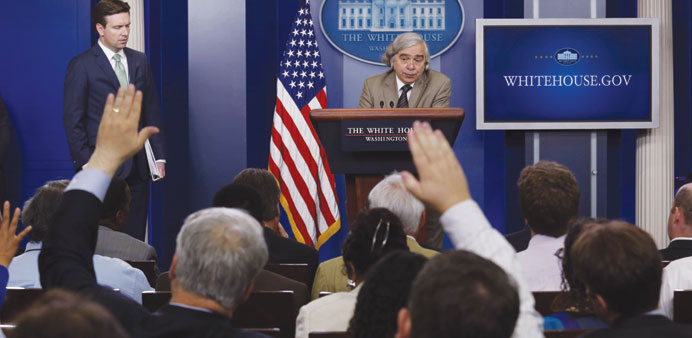US Energy Secretary Ernest Moniz speaks about the Iran nuclear agreement during a press briefing at the White House in Washington yesterday. Members of the Obama administration intensified efforts this week to beat back criticism of the deal and convince US lawmakers that rejecting it would backfire.
Reuters
United Nations
The UN nuclear watchdog chief will meet with the US Senate Committee on Foreign Relations yesterday in Washington to speak about his agency’s monitoring role in Iran following Tehran’s deal with world powers on curbing its atomic activity.
The International Atomic Energy Agency said in a statement yesterday that Director General Yukiya Amano “will discuss the IAEA’s role in verifying and monitoring nuclear-related measures under the Joint Comprehensive Plan of Action”.
Amano has the delicate task to assess Iran’s past and future nuclear programme. He has no political mandate and never tires of stressing the IAEA’s technical role.
He must nonetheless manage and maintain a fine balance between delivering data on Iran’s nuclear activities and the major political consequences such information can have.
If Iran were to break its promises made in the historic July 14 deal reached with six world powers, Amano and his inspectors would be responsible for detecting and telling the world about the breach. The nuclear agreement will have to be ratified by the US Congress. It has until September 17 to accept or reject it.
The IAEA said it is normal practice for it not to publish safeguards arrangements with countries and that Iran is no exception, adding that the arrangement it reached with Iran on July 14 meets its requirements to clarify outstanding issues.
US Republicans have objected to the deal as not tough enough to stop Iran obtaining a nuclear weapon in the long run.
At an emotional Senate hearing this week, US Secretary of State John Kerry warned that rejecting the deal would remove all limits on Iran’s nuclear work, give it a fast track to a weapon and access to billions of dollars from collapsed sanctions.
Under the July 14 pact, world powers agreed to lift sanctions in return for curbs on a nuclear programme the West suspects was aimed at developing the means to build an atomic bomb. Tehran says it seeks only peaceful atomic energy.
US President Barack Obama on Thursday told groups that support the deal to make their voices heard to Congress to counter the millions of dollars in lobbying by those who want to derail the agreement.
“Right now the opponents of this deal have been flooding Congressional offices,” Obama said on a call with groups including the Washington-based think tank Center for American Progress.
Groups who opposed the deal, such as American Israel Public Affairs Committee known as AIPAC, have spent $20mn in TV ads to put pressure on members of Congress, Obama said.
“They start getting squishy because they’re feeling the political heat,” Obama said of members of Congress he has met with in recent weeks.
Obama did not thank the groups for any of their support so far, but rather pressured them to step up their efforts.
He drew comparisons to the lead up to the Iraq war, noting that groups who opposed it were not vocal until it was too late.
“In the absence of your voices, you are going to see the same array of voices that got us into the Iraq war, leading to a situation in which we forgo a historic opportunity and we are back on the path of potential military conflict,” Obama said.
If upheld, the deal is certain to shape Obama’s legacy as he prepares to leave office. He said he has never been more certain of a policy decision.
Four Democratic representatives voiced their support for the deal on Thursday, including Senate candidate Chris Van Hollen and Dan Kildee, who represents the district of Amir Hekmati, who is being held in Iran.
The White House said its supporters so far have contributed to 70,704 e-mails and 63,862 calls to members of Congress, urging them to not reject the deal.

